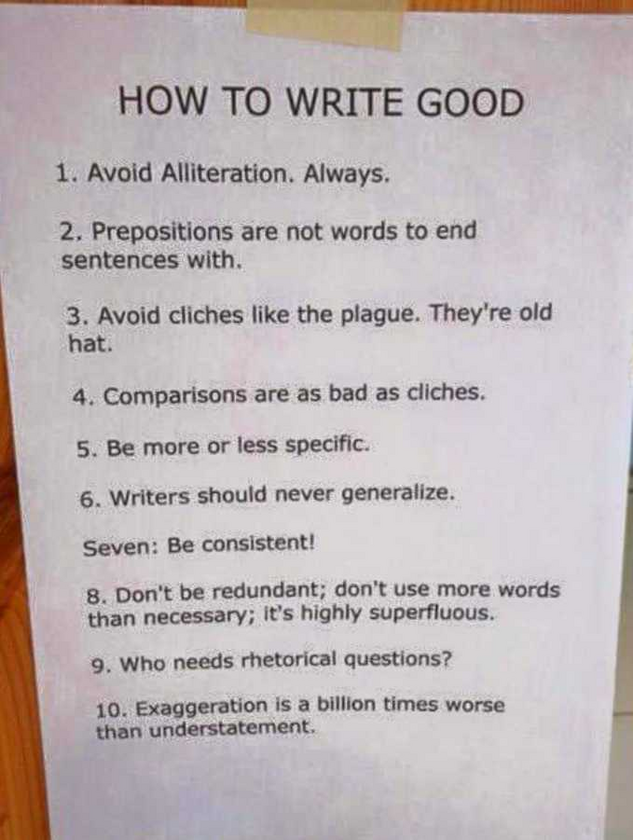“Sixty percent of the time, it works every time." - Brian Fontana played by Paul Rudd
All leaders have gone to a meeting, sat in their seats, and sipped on their cups to listen to the information their team was providing them. The team worked hard on the material they wished to present, and you do your due diligence to absorb it. In that meeting, you might communicate a question to a supporter similar to, “When will that get done?”
You may hear, “today,” “next week,” or sometimes you may hear “I believe on Friday.” Depending on what needs getting done, or what your job might be, some of these responses are unacceptable. Can you determine which ones? In this article, I am going to explore those words or phrases, I think we have all heard, that are inexact. A way for people to remain imprecise to avoid responsibility or provide a specious but meaningless answer.
We will not cover tyrannical or casuistry language. Tyrannical language is words or phrases people use to shut you down or eliminate you from the conversation. Casuistry language is similar, oversubtle or deceptive words and phrases, but holds a moral or ethical inaccuracy. Both of these types of languages enable dishonest or bullying types of communication that would be grounds for more training or termination. I have found these types of languages are easier to spot unless they are a blatant lie which requires discovery and is another type of language I will not discuss here.
Inexact language is exactly what it sounds like. Imprecise, inaccurate, slightly indiscernible, and hard to fully understand. Last week, we talked about active listening and it is fair to point out that these types of words and phrases make active listening difficult. Inexact language falls into the obfuscation fallacy which, “refers to the deliberate act of creating confusion, ambiguity, or concealment to obscure the true nature of something” (howtogetyourownway). Simply put, obfuscation is the ability to speak a lot of words and say nothing.
"Our focus has been on strengthening America and doing the work every day that is about seeing through what we are doing." - Kamala Harris
Language that is difficult to discern:
‘Almost certainly’ or ‘maybe sometimes’: phrases that when you think about them, do not make sense. They are similar to the quote above from Paul Rudd in “Anchorman: The Legend of Ron Burgundy.”
A couple / Maybe / A few / Never: Words that I always look for as they lead to indeterminate timeframes. In project management, precise timelines are imperative.
I’ll be there directly: How long then? I was always told to say, “I don’t know,” if you don’t know the answer. Followed up with, “I will find out immediately and report back what I find.” Admitting you don’t know and you're working to find out is a far better way to respond and leaders should require this over a maybe. Lastly, ‘never’ is a very finite conclusion and I am not sure you can honestly say never in a myriad of situations.
I believe so / I might be able to / I’ll try: Can you do it or not? Leaders should ensure that supporters can and will do what they require.
We are preparing to prepare / We are planning to plan / Let’s have a meeting to schedule a meeting: A consistent bane in my leadership experience. Not only are these phrases an acknowledgment of time wasted. It is also an indicator that a supporter has not done the correct steps to execute the tasks or they didn’t prepare.
At the end of the day / close of business: Although seemingly innocent, problems arise when you may need an action completed at a certain time. What if that supporter works hard all day and evening on the project making their end of day after your deadline? It is always better to just give an achievable time to a task than leave this open-ended.
It’s on my radar: I would respond with, “Is it calibrated?” Another innocent phrase that when you consider this more, leads to a miscommunication of what that person means. What is on your radar? What does that mean? What are you doing about it? What else is on your radar? Simple considerations make this phrase insignificant to better communication.
Language that does not work as it is applied:
To be honest: Why does this phrase usually proceed with something that isn’t going to be honest? I know you are at least thinking about it. If you are an honest person, do you need to proclaim your honesty to the world first?
No offense, but… or most anything that follows the word ‘but’: I believe providing your thoughts is difficult, so we say it nicely, use the word ‘but’ and then proceed with what we wanted to say. It is also possible, that If you have to use the word ‘but’ maybe your point is not well conceived. Try stating your point of view as constructive criticism, or just state what would have followed the ‘but.’
New normal: A COVID-19 euphemism that tries to describe doing things differently and we just have to get used to it. The problem is that it quickly became an umbrella term that lost finite meaning over time. The new norm was applied as a blanket statement for anything the government needed to include in the term.
Everyone knows this or agrees with me / the majority of scientists agree: Another amazing statement that is antithetical to what the person is saying. Science or fact doesn’t require consensus, it requires validated testing to determine whether a hypothesis is provable or factual or law. The amount of people that agree is not important. This can also apply to how you lead. The right things do not require consensus.
Language that shirks responsibility:
I'm not responsible for that / it is not my slide: An obvious dodge of blame to look out for in your organization. This especially tends to happen with shared or collaborative documents. My response is usually ‘then go find out who is responsible and report back to me’. Another trick to render this statement inert is to assign responsibility and make notes in future interactions.
Let’s circle back: Made famous from reporters to politicians who do not want to answer your question. This family of responses is a way for a supporter to avoid stating they don’t know, or evade saying something that might be damaging. Do not let your employees ever circle back.
It is what it is: Another statement that is meaningless and impacts your organization from learning lessons that could prevent future mishaps. Even if it is actually whatever it is, like an “act of God,” great leaders limit future impacts to operations. The appropriate action is to identify the hazard, determine ways to mitigate the hazard, reduce the threat of that hazard, and implement those reduction measures so that future actions are less risky.
I was just joking: Were you though? Similar to no offense, this phrase is a coping mechanism to reduce perceived harm from a statement that a supporter probably shouldn’t have said in the first place. If you tell a joke, own it, if you are saying something offensive, own it.
I couldn’t possibly have known: This phrase could be true, however, the appropriate response to the supporter is to go find out. It implies that they were either not aware or did nothing to achieve awareness. Leaders should enforce and train better communication internally to their organization to reduce these statements.
I cannot recall or as far as I recall: Did you recall it or not? This screams to me that they just don’t want to tell you the truth. This phrase might work in politics or in court, but I don’t recommend it for your organizations.
I got you: This sounds simple, but think of it in the context of asking for a supporter to repeat your message so you can ensure they understood you. Do you allow this type of response or enforce a better standard that allows you to check whether that supporter heard your message?
Citations used in this article:
Anchorman: The Legend of Ron Burgundy, Director: Adam McKay, Performer: Paul Rudd, Apatow Productions, 2004.
Craig Shrives, howtogetyourownway, accessed on 15/1/2024, https://www.howtogetyourownway.com/fallacies/obfuscation_fallacy.html.
Words and phrases developed through collaborative work with friends, family, and colleagues.
















